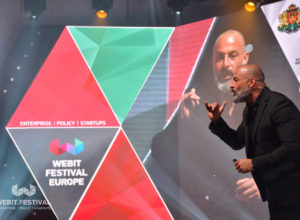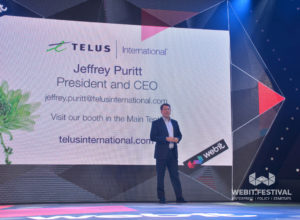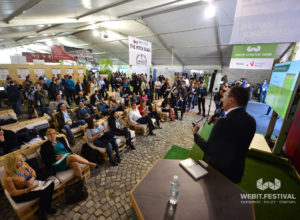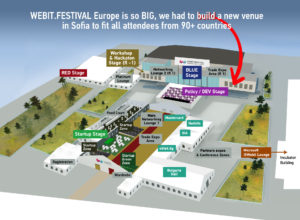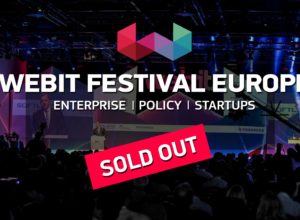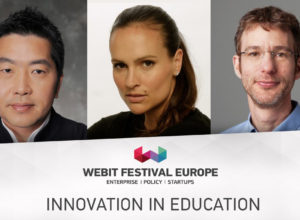The key to innovation is having an open mind and desire...
The concept of Digital Single Market that covers digital marketing, e-commerce and telecommunication sectors in Europe was officially presented by the European Commission in May 2015 and was pre-announced on the stage of Webit’s CEEDS in April 2015.
The Vice President of the Commission Andrus Ansip explained that the realization of the project could contribute €415 billion per year to the common EU economy and create hundreds of thousands of new jobs.
More than two years after its announcement the Digital Single Market is still looks more like a great idea than а reality. And according to the famous marketing strategist and trendwatcher for Fortune 500 companies Igor Beuker this could be the greatest chance that Europe have, if it wants to catch up with the competition of economic juggernauts like USA and China.
On the stage of Webit.Festival Europe he shared his Math Man view on why intelligence is the ability to adapt to change. This skill is increasingly important in the corporate world, struggling with the process of digital transformation.
During his keynote speech at the Opening ceremony he showed the audience the latest trends in the digital economy and presented his thoughts on the current systems, that were developed for the 20th century.
He explained that Digital Darwinism is the phenomenon in which trends, technologies, consumers and society evolve faster than established brands can adapt. It’s a fate that also threatens governments, institutions, and all other corporate organizations. Today, tomorrow and in the unforeseeable future.
“For almost 25 years I am witnessing that advertising may win quarters, innovation wins decades. I don’t need to know much about technology, I’ve just got an open and limitless mind. I’ve learned that i.e. our financial, political and educational systems were built for the 20th century. It’s about time we seriously upgrade these systems, so we can finally deal with the challenges and opportunities of this 21st century”, said Mr. Beuker.According to Beuker, the traditional corporate world is ruled by “Mad Men”, who keep spending billions of dollars on advertising, backward-looking market research and consultancy services, but fail to innovate. That’s why Mad Men are losing the war from the Math Men. The exponential growing disruptors, who all have a trend-driven, opportunity-seizing innovation culture. He gave examples of Blockbuster, Kodak, Nokia and many other heritage brands, who neglected trends forever, but kept spending billions of dollars on advertising, IBM consultants, old school R&D, and backward-looking market research. Still they lost. The lifespan for Fortune 500s is declining at a pace we’ve never seen before in history. A serious wake-up call. On the other side we see exponential growing companies like Amazon, Tesla, Facebook, Google, Airbnb who are spending billions of dollars per year on trend-driven innovation, not on advertising.
“Amazon spends $13 billion per year on innovation, Walmart and Target each spend $2 billion per year on innovation. Incumbent brands are all addicted to advertising, and miserably fail at innovation. The reason is not technology, because we all have access to the same technologies. The problem with Mad Men is their DNA, mentality and mindset. They’d rather wait 4 more years on relevant business cases. While Math Men are the business case”, Beuker stated.The expert thinks that the main problem with the big brands is their “buy not make mentality” - they are trying to acquire innovators, instead of innovating themselves. Beuker is sure that if the corporations don’t start to effectively innovate, they may no longer exist in 5 to 7 years. The biggest advantage is the fury of the founders of the new digital giants, like Amazon, Tesla and Alibaba. Math Man like Jack Ma has a purpose in life. In 20 years, he wants to grow Alibaba from 500 million to 2 billion customers worldwide, make 10 million retailers profitable and create 100 million news jobs. The Math Men generation entrepreneurs will have a much bigger impact on our global economy than politicians, who have no clue about the digital economy or how to deal with robotization and jobs.
“Digital single Europe is so important because we need startups and unicorns. They will provide new jobs, will create growth, will increase Europe’s GDP and will support our digital markets. We don’t have Facebook, Google, Airbnb and others, but we would like to have them. Politics and the EU need to facilitate businesses much better. Banning Uber is an ignorant way to block innovation”, said Beuker.Soon you will be able to see his full presentation on our YouTube channel. If you want to keep up with the latest trend in the world of digital economy and technology, then Webit.Festival is the right place for you. Visit our website and book 2 of our Super Earlybird tickets for Webit.Festival Europe 2018 for just €100.
In customer service robots are going to assist humans, not replace...
In the information age we live in, keeping your business in a very close relationship with its customers or clients the most important premise for success. And if you don’t believe in this way of doing business, you better start to, because it is one of the driving forces that fueled the expansion of a company, valued at more than $1 billion.
The President and CEO of TELUS International Jeffrey Puritt was among the top speakers at this year’s Webit.Festival Europe - the premier digital and tech festival in the region. His opening keynote gave our guests a glimpse in the management processes in a global company with more than 25 000 employees and its communication with the customers.
On April 25-26 the event gathered in Sofia more than 5100 attendees coming from over 90 countries. Among them were policy makers, innovators, entrepreneurs, investors, scientists and experts fascinated by technology and fostering the digital transformation in the business and the society.
For the last 15 months the management of TELUS increased the customer satisfaction from 74% to nearly 91%, while the clients of the company registered increased profitability and revenues.
According to Mr. Puritt, the main reason for this is a world class customer service and a corporate culture, that engages and inspires all the team members of the company.
In an age of automation and upcoming AI revolution, TELUS is investing in its employees while continuing to embrace the latest high-tech approaches to the customer service. The CEO is sure that in this specific field, the future of AI is focused on supporting, not replacing humans. And the reason for this is that there are many things we can do better than machines.
Jeffrey Puritt said that when society progresses we often turn to technology over a human touch. But replacing human interaction, such as live agents, with chatbots and computer programs gives the consumer the feeling of losing touch with the company.
“Technology is making increasingly hard for brands to keep this important connection with consumers. A recent study found that 83% of consumers prefer dealing with human beings over digital channels when it comes to solving their issues. We need to become more thoughtful and deliberate in the way we are using technology”, he suggests.Right now the AI systems still have their limitations. Machine learning requires huge volumes of past data, while humans don’t. A recent study showed that despite of the automation processes that are going on, the number of support agents worldwide will increase with between 10% and 50% by 2020.
“Not only will we need new agents, but a higher skilled agents who can solve more complex customer problems. More than ever now the customer service agents are the key to providing a world class brand experience”, Puritt said.As the science of the customer experience continues to evolve with new technology the need to provide a high-touch experience to truly win the hearts and minds of consumer grows. But the foundation for this is building an exceptional employee experience. In his opening keynote Jeffrey Puritt spoke about several other topics, such as using omnichannel approach for building customer loyalty and better connection with clients and reaping the benefits of Big Data analytics for creating a better customer experience. Soon you will be able to see his full presentation on our YouTube channel. If you want to keep up with the latest trend in the world of digital economy and technology, then Webit.Festival is the right place for you. Visit our website and book 2 of our Super Earlybird tickets for Webit.Festival Europe 2018 for just €100.
Webit.Festival presented to the world green startups from Bulgaria and Northern...
As the Fourth Industrial revolution unfolds and the world is gathering for the fight against the climate change, the development of green and clean technologies emerges as one of the key factors that will shape our common future.
The specifics of this important sector implies that big part of the innovations comes not from the big corporate players who are struggling with the difficult process of digital transformation of their business, but from small startup companies, capable to disrupt the industry with their ideas.
Last week, the most influential event for digital economy and innovation in the CEE region, Webit.Festival Europe, presented to its international audience ten green companies from Bulgaria and Northern Europe and dedicated a special Green zone for them.
The names of the companies involved are Desertcontrol, CO2 Cards, Sweet Home, Greencorp.io, Galex, Teraloop Ltd., Enerwall, Narcine, Sea Harmony Ltd. and QQ Natural.
All of them were part of the big Founders Games challenge in which 100 startups, selected from more than 2450 candidates, competed for a €200 000 seed investment. The big prize was provided by the Executive Chairman of Webit Foundation Plamen Russev, the Co-founder of Telerik Academy Vasil Terziev, the Co-founder of Imperia Online Dobroslav Dimitrov and the Co-founder and CEO of Chaos Group Peter Mitev.
The participants in the competition received free exhibition space and tickets for the festival, as well as the opportunity to present their ideas on the Webit’s Startup stage in front of business leaders and investors. You may find the names of the 100 Founders Games participants and more information about their activity here.
Among the members of the investors jury were proven experts like Prof. Shafi Ahmed (Co-founder of Virtual Medics and Medical Realities), Lisa Latts (Deputy Chief Health Officer for IBM Watson), Jonas Jacobi (VP, Cloud and Mobile Technology Strategy, IBM), Sohaila Ouffata (Investment Principal BMW i Ventures), Sridhar Iyengar (CEO, Elemental Machines), Gareth Williams (Founder and CEO of Skyscanner) and a number of top experts from the world’s largest companies.
The Nordic startups arrived in Bulgaria with the help of Innovation Norway program - the Norwegian Government’s most important tool for innovation and development of local companies and industries.
On April 25th and 26th Webit.Festival gathered in Sofia Tech Park more than 5000 attendees from Fortune 500 companies and major brands, policy makers, innovative founders and academia representatives, coming from more than 90 countries.
The event’s agenda included 12 parallel conferences, deployed on 4 stages and covering topics, such as Marketing & Innovation, Digital Economy Leadership, Smart Cities, Mobility, Digital Transformation, FinTech & Blockchain, Big Data & Cloud, Security & Privacy, Health & Wellbeing, IoE and Software Development.
[easingslider id="4954"]
CONELUM is the big winner in Founders Games 2017
The biotech company CONELUM won the €200 000 seed investment in this year’s Founders Games. The event was part of the agenda of Webit.Festival Europe - the most influential event for digital economy and technology in the CEE region.
An international jury of investors evaluated the pitches of the 100 finalists from 2450 candidates in the dedicated startup zone.
With over 93% startup failure overall rate, the selected Webit startups for the Founders Games’s semi-finals in the past 7 years have less than 30% failure rate. Being among the Webit's Founders Games startup list is a statement of the company's credibility, innovation and potential in front of enterprise and investors as well as a great marketing opportunity.
This year’s event presented to its international audience some of the most interesting Green startups from Northern Europe, that arrived in Bulgaria with the help of Innovation Norway program - the Norwegian Government’s most important instrument for fostering innovation and development of local companies and industries.
Among the jury members you could see names like Prof. Shafi Ahmed (Virtual Medics & Medical Realities), Lisa Latts (IBM Watson Health), Jonas Jacoby (Cloud and Mobile Technology Strategy, IBM), Sohaila Ouffata (BMW i Ventures) and a number of representatives of the largest companies in the world.
The top 5 companies had the chance to pitch their projects on Webit’s biggest stage and to compete for the grand prize in the challenge. The finalists were the Austrian health tech company Tec-Innovation, which develops an intelligent high-tech shoe that detects obstacles and improve the life quality of blind people, the Latvian biotech startup CONELUM, which has created a proprietary joint-solution for ultra-fast microbiological diagnostics & enumeration at ultra-high sensitivity level, the Slovenian company Feelif, which enables blind and visually impaired people to feel shapes on a standard touchscreen, Amiko (Italy), which delivers medication adherence solutions for chronic respiratory and diabetes care, powered by our proprietary Quantified Medicine technology and the Bulgarian startup Melissa Climate - an IoT company which changes the way people use the appliances they already have by connecting them to the Internet and enabling the end-user to monitor and control their home remotely.
The final decision on the winner of the big prize was taken by four investors - the Executive Chairman of Webit.Foundation Plamen Russev, the Co-founder of Telerik Academy Vassil Terziev, the Co-founder of Imperia Online Dobroslav Dimitrov and the Co-founder and CEO of Chaos Group Peter Mitev.
Their evaluation was based on five main factors - team capacity, project scalability, business approach, marketing approach and uniqueness of the idea.
Webit adds a new stage to welcome all of its 5000+...
This year’s edition of Webit.Festival Europe will be unprecedented in its size for the CEE region. The number of attendees will be nearly 30% higher than last years.
The event will be held on April 25-26 in Sofia Tech Park under the patronage of the President of Bulgaria Rumen Radev, the Mayor of Sofia Yordanka Fandakova and the European Commission.
After the huge interest in the past days and weeks, Webit Team is proud to announce that we are building a new conference hall and will have hundreds of additional seats for our valued guests.
The Red Stage of the event will be exported outside the venue building to accommodate the huge number of visitors. Right now we are building thousands of square meters of facilities in addition to the buildings already involved.
The official agenda of Webit.Festival includes 12 parallel conferences on topics, such as Marketing & Innovation, Digital Economy Leadership, Smart Cities, Mobility, Digital Transformation, FinTech & Blockchain, Big Data & Cloud, Security & Privacy, Health & Wellbeing, IoE and Software Development.
Among our speakers you will meet Fortune 500 representatives, top brands, policymakers, founders of some of the most innovative businesses and the most exciting startups, not only in the region, but all over the world.
This year 5062 people have registered for the event. They are coming from more than 90 countries.
The leaders of some of the largest innovative tech companies in the world will arrive in Sofia along with founders of businesses like Skyscanner, valued at more than $1.74 billion.
Webit attracted 2425 startup companies who think of the festival as a step towards their success. 100 of them were selected and will receive free-of-charge stands, tickets for the event and an opportunity to meet unparalleled selection of top enterprise leaders and investors, while presenting themselves in front of the world.
They will also get the chance to compete for a €200 000 seed investment in our Founders Games.
The market valuation of the selected startups is more than $1 billion, and so far they have attracted multimillion investments.
With over 93% startup failure overall rate, the selected Webit startups for the Founders Games’s semi-finals in the past 7 years have less than 30% failure rate. Being among the Webit's Founders Games startup list is a statement of the company's credibility, innovation and potential in front of enterprise and investors as well as a great marketing opportunity.
Webit.Festival is officially sold out. Join our waiting list for the...
With less than a week prior to the event, we are proud to announce that the tickets for Webit.Festival Europe are officially sold out!
Right now, we have 4806 registered attendees from more than 90 countries. All of them shall connect with some of the world’s top digital and tech leaders, investors, founders and media, during the two-day agenda of the festival.
Webit.Festival is one of the most influential digital and technology events in Europe. This year’s edition of the festival will again take place in Sofia on 25-26 April. The event’s motto is re:Inventing Europe’s Future. It is held under the patronage of the President of Bulgaria Rumen Radev, the Mayor of the Sofia Mrs Yordanka Fandakova and is supported by the European Commission.
The event is part of Global Webit Series, that includes Istanbul (Webit.EMEA), Dubai (Webit.MENA), Singapore (Webit.APAC), New Delhi (Webit.INDIA) and Sofia (Webit.Festival Europe) thus bridging digital Europe, Middle East, Africa and Asia.
Our attendees will hear about the future of Virtual and Mixed Reality, Artificial Intelligence, Marketing, Mobility, Smart Cities, FinTech, IoE, Health and Software Development from 300 top level speakers at Webit’s 12 parallel conferences. You may see the full festival agenda here.
Among them you will find some of the companies on the Fortune’s 500, top brands, policymakers, founders of some of the most innovative businesses and the most exciting startups, not only in the region, but throughout the world.
Part of our mission is helping startups with great ideas present themselves to a wider audience and giving them a chance to compete for a €200 000 seed investment in Webit’s Founders Games.
One hundred startup companies with a total market valuation of more than $2 billion will take part in this year’s edition of the competition. They were selected from over 2450 applicants from all over Europe.
On April 25 Webit will present its annual Awards during a glamorous black tie ceremony. The evening dresses and suits will be only a fraction of the incredible experience for the hundreds of attendees. Limited amount of seats are still available on the website of the event.
The winners in the various categories will have the honor to receive their awards from some of the world leaders in their fields.
If you still haven’t got a pass for the event, Webit gives you the opportunity to join our waiting list! A limited number of tickets for the festival shall be presented to selected applicants.
Webit’s Founders Games presents Europe Top 100 startups for 2017
One hundred startup companies with a total market valuation of more than $2 billion will present their innovative ideas at this year’s Webit.Festival Europe - the most influential event for the digital economy and technology in the region, part of the Webit Global Series of events and Webit Global Community.
An international jury of investors will assess their pitches on the dedicated Startup stage. The best five companies will come out on the big stage of Webit and will compete for the grand prize in the Founders Games challenge - a €200 000 seed investment.
The selected 100 startups are divided in 3 groups:
- Pre-Seed (no investment yet but great ideas and teams)
- Pos-Seed (up to €1 million investment)
- ScaleUps (above €1 million to 10 million investment)
The competition includes 17 startups, that have received big investments in the recent months. The Israeli company PayKey received more than $6.4 million in november. The startup enables payments within any social network, including Facebook Messenger, WhatsApp and Twitter and any place you have a keyboard.
In May the Hungarian startup SignAll received $1.72M from three investors. The company created the first sign-to-text solution that enables real-time communication for the deaf with mass market appeal. The software automatically process sign language into grammatically correct sentences.
Onni Care from Finland has attracted investment for more than $1 million. The company is producing IoT baby monitor devices and a dedicated app, where parents can track day to day and long term development of their child.
The Turkish startup Twentify received more than $1 million seed funding. The company provides field operations and data collection to companies by leveraging the power of crowdsourcing. It delivers Bounty, a mobile crowdsourcing platform, allowing a global mobile workforce to deliver fast and cost effective data collection to businesses.
Among the members of the Jury you can see names, such as Prof. Shafi Ahmed (Consultant Surgeon and Co-founder of Virtual Medics & Medical Realities), Lisa Latts (Deputy Chief Health Officer for IBM Watson Health), Tanja Kufner (Managing Director, Startupbootcamp Smart Transportation and Energy), Jonas Jacobi (VP, Cloud and Mobile Technology Strategy, IBM), Sohaila Ouffata (Investment Principal BMW i Ventures) and a number of investors and representatives of the largest companies in the world.
The startups, that are part of the challenge, were chosen from 2425 applications from across Europe, based on the uniqueness of their ideas, the capacity of their team, the opportunities for growth and their business and marketing approach. You may see a full list of the Europe Top 100 Startups here.
This year, Webit.Festival will present to its international audience some of the most interesting Green startups from Northern Europe. They will arrive in Bulgaria with the help of the Innovation Norway program - the most important instrument Norwegian government use for assisting innovation and development of local businesses and industries.
On April 25 and 26 the event will gather in Sofia Tech Park 5000+ visitors from over 90 countries. More than 300 speakers will share their invaluable experience from leading global companies will help us adapt to the trends that are going to change our lives fundamentally in the next few years.
Here you can see a full list of the confirmed speakers at Webit.Festival, while here you can get all the information you need about the tickets for the event.
Webit.Festival will present to you the digital future of education
Technology is rapidly changing the world around us. Many teachers worry that as computers take over most of our daily tasks, there will be no students to teach anymore. But the reality is that education will never disappear, it will just take new forms and will give us the tools we need, so that we can be successful in the society of the future.
Experts predict that one of the main changes to come is the increase in diversity of learning opportunities at different times in different places. This means that in the near future our children will learn the theoretical part of their curriculum outside the classroom, while the practical part will be taught face to face.
This year, Webit.Festival Europe will gather in Sofia Tech Park more than 300 speakers from every corner of the world. Within two days (25th and 26th of April) they will share invaluable experience from the largest enterprises in the digital industry and will explain to more than 5000 attendees from 90+ countries the key factors that will shape our future.
The main theme of the event is re:Inventing Europe’s Future, and what better way to do it, than through quality education and developing the right skill sets for the labour need of tomorrow’s enterprises.
During the Innovation in Education track of the IoE Summit you will get the chance to listen to the Director of Strategic and International Development at Wolfram Research Conrad Wolfram, who will explain how the importance of quantitative understanding for jobs, society and management has exploded over the last few decades. He will also talk about the importance of understanding the changing role of computers and automation of knowledge is crucial.
The CMO of Edulab Norihisa Wada will speak about changing and sustaining learner behavior. Behavior changes are central to all learning conditions. They involve motivating people, increasing their self-efficacy, and altering their intentions, beliefs and desires.
Game mechanics if put to good use are a great way to achieve all these elements. They provide intrinsic motivation, instant feedback and a safe artificial environment to learn. Mr Wada’s presentation will introduce the audience to such “gamify” design and approach trends in learning.
The Opera Singer, Songwriter and CEO of Wurrly Nadine Levitt, will talk about the role technology plays in education, and how such technology can positively impact future learning.
She thinks that educational technology should engage learners and make them participate in and experience the learning processes, just as they no longer consume passively media products.
The CEO of Babbel.com Markus Witte will tell us about the latest trends in languages learning and the changing ways we communicate with each other. In just a few years the market for cloud-based language education has grown into a much-discussed phenomenon and is expected to gross $6 billion by 2021.
Here you can see a full list of the confirmed speakers at Webit.Festival, while here you can get all the information you need about the tickets for the event.
Come to Sofia and attend the unprecedented Webit Awards ceremony
Just two weeks are separating us from the Webit Awards ceremony, also known as “The Awards of the Future”, which is with unprecedented scale for the region.
The glamorous event will be held on April 25 in Sofia Tech Park and will be broadcasted on television. The evening dresses and suits will be only a fraction of the incredible experience for the hundreds of attendees. Limited amount of seats are still available on the website of the event.
Becoming a part of the Webit Global Community, those guests will join the people who draw the future of the world today. The winners of Webit Awards are global leaders, who change the world.
Business and academic leaders, along with mayors, legislators and politicians will be nominated and awarded by world leaders from the Webit Community for their achievements and their role in fostering the best business models and innovations, development of digital economy, policy and government initiatives for successful integrations of technology solutions and improving people’s quality of life.
The spectacular ceremony is just a part of the agenda of Webit.Festival Europe - the most influential digital and technology event in the region, part of the global series of events and the Webit Community.
This year, the festival will gather in Sofia Tech Park 5000 attendees from more than 90 countries. Over 300 speakers will share their invaluable experience from leading global companies and will help us adapt to the trends, which are going to change our lives radically in the next few years.
The awards categories are divided in several areas - Enterprise (Innovations in education, transport, banking and finance, cyber security, tourism, enterprise software, advertising, marketing, etc.); Digital Apps (apps for entertainment, banking, finance, gaming, news and sport); Policy (for Smart City Administration, Smart Transport, Smart Energy, Innovative Legislation Initiatives) and Special Awards that will distinguish the most successful woman in the technology sector, the most innovative secondary school and the person with outstanding contribution for the digital industry.
The winners in the various categories will have the honor to receive their awards from some of the world leaders in their fields. The award for Innovation in Education will be presented by Conrad Wolfram - the man, who changes the teaching methods worldwide and Founder of Wolfram Alpha.
The most successful healthcare innovators will have the opportunity to be awarded by Prof. Shafi Ahmed and Dr Lisa Latts. Ahmed is one of the most famous surgeons in the world and the first one to perform a series of operations with virtual reality gear. Lisa Latts is a Deputy Chief of IBM Watson Health - one of the most developed AI projects in the world of healthcare, which is already replacing doctors in diagnosis.
Awards for Marketing and Advertising and the other categories will be presented by the Global President of Havas Worldwide, the Global Marketing and Creative Director of DigitasLBi, editors of Forbes and Huffington Post, leaders from Google and many others.
The official Webit.Foundation Awards ceremony will be held on April 25, 2017 in Sofia Tech Park.
The seats are limited! You may book yours here!
